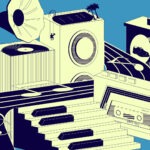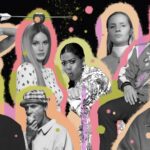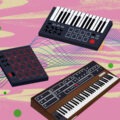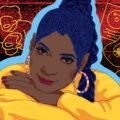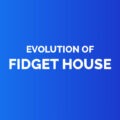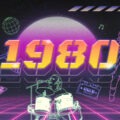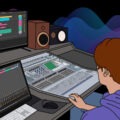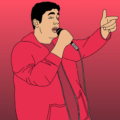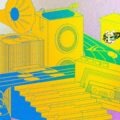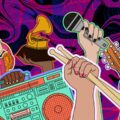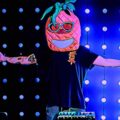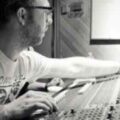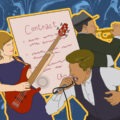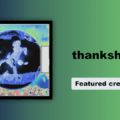What comes to mind when you think about improvised and experimental music? Jazz? Conceptual frameworks? André 3000’s latest album?According to musician and organizer Raphaël Foisy-Couture, the answer is all of the above – and more. We invite you to dive into a world of freedom and possibilities for sound and human experience.
RAC: What do we mean by improvised and experimental music?
Raphaël: These are very broad terms. When we talk about improvised music, some people will for example think of jazz, or more European idiomatic improvisation inspired by contemporary music, or a practice that uses improvisation as a way of making music. It’s the same with experimental music: you could as well have a noise-rock band, or people making music by rubbing feathers on cactuses.
It doesn’t have to have a constantly fixed form, which is what I like about it. It’s music that moves, that has tension, that has movement. This kind of music depends a lot more on the people who play it than on format, form, aesthetics or composition. In my community, most of the music is improvised, but it’s not just free improvisation – people come from all kinds of practices. In that sense, it’s experimental, because you don’t know if it’s going to work! Different possibilities come together, and we don’t know what the result will be! You can have surprising orchestrations, very static or very noisy music, incredible lyrical beauty, or something that stays close to conventional jazz.
RAC: Apart from your role as a musician, what are the other aspects of your work?
Raphaël: I do a lot of organizational and community work around improvised and experimental music. I also run a small record label, Small Scale Music, which has been going since 2013. We do all kinds of small releases – cassette, digital, CD, zines. Through this label, I also organize shows and tours for visiting artists.
I’m a member of the Mardi Spaghetti collective, which has been organizing experimental and improvised music concerts for 15 years. We put on at least two concerts a month, with a different line-up each time. It’s a series that has always been entirely run by volunteers and musicians involved in the scene. What’s interesting about this series is that it features people performing for the first time, as well as musicians with decades of experience, or who come from all over the world to play together. It creates these encounters.
RAC: How did your interest in this kind of music come about?
Raphaël: I’ve always been passionate about music, as much for the human aspect as the social aspect – you always end up meeting people. When I was younger, I used to go to a lot of punk shows and local concerts. Even back then, I was interested in the organizational side of things, promotion, posters and stage dynamics. Most importantly, it was music that seemed accessible to me, where I could present myself. The concerts take place in small venues, are inexpensive and offer the chance to see something without really knowing what it is.
With experimental music, there’s an openness to different approaches. The shows operate on a smaller scale, so you can meet musicians straight away. There’s a community, and that’s what appealed to me. This kind of music also has a punk aesthetic. The DIY organization makes it possible to come up with things that challenge aesthetic and social conventions.
I didn’t study music, and didn’t think I’d ever make music. Listening to different things made me want to make music for fun, just to make sounds. It’s music that I’ve learned to listen to, to love, to constantly be somewhat startled by. As a teenager, the first time I heard a project that was so different – Miles Davis’ Bitches Brew – I hated it so much, it felt visceral! I didn’t understand it, I was angry at not being able to figure it out. But, at the same time, it was as if I couldn’t stop listening to that record. Eventually, subversively, I began to like it more than the other records I listened to, because I had to make an extra effort. I had an aesthetic and emotional connection to it. From that moment on, it opened the door to discovering all kinds of music.
RAC: Is it music that requires effort to listen to?
Raphaël: There are so many different styles. A lot of the music requires effort. Much of it tries new approaches. Sometimes, fundamentally, it’s not music that’s pleasant to listen to. It opens up possibilities for research, error and failure. Aesthetically, it can be more difficult, for example, if you hear someone banging on a drum kit with a drill, people making noises like dying animals or spaceships, or someone putting water in their saxophone. It can be very comical too.
This type of music has more immediacy to it. The listener witnesses the creative process, the person’s reflections, the encounters. It’s all happening at the same time, before our very eyes. It’s living art. You can be part of it. It’s aesthetically challenging, but I think that on a human level, it’s one of the most accessible forms of music. It doesn’t require a huge investment, and people are full of kindness and social conscience.
RAC: How do you go about capturing this music?
Raphaël: When it comes to recording and documenting, there are lots of different ways of doing it. Sometimes it’s very DIY, with bootleg recordings, zoom recordings or portable recordings. I’ve made records in rehearsal studios, on tour, in recording studios, empty concert halls, bedrooms, outdoors. If you have a place, a recording device, and time, you can do anything. You can also record in a traditional recording studio. However, not all engineers are able to work with these musicians, because the result is never the same. We don’t know ourselves what we’re going to do!
These days, with everyone putting music online, there are increasingly less standards for how records should sound. The conventions are opening up more and more. We’re constantly faced with new ways of producing. Lo-fi is making a comeback, particularly in hip-hop, as a chosen aesthetic, no longer imposed because of a lack of resources or technical or financial means.
For instance, André 3000’s new album sounds like an experimental cassette released on an ambient music label. It’s not a hi-fi or high-fidelity album. It reminds me of many similar experiments, or of friends’ albums released in 100 copies. But this is an album that plays in cafés. People who never listen to this kind of music are discovering it. Listeners aren’t shocked to hear grain on the album, or that there are plenty of imperfections in the sound. It also shows how experimental approaches drive technical innovation, even in the mainstream, thanks to the work of people who try out less conventional sound experiments. Hip-hop producers are a good example: some of them work from home and do amazing things. Nowadays, there isn’t much difference between that and acousmatic or electro-acoustic music. There’s so much overlap that the music can sound any way it wants.
By Christelle Saint-Julien
Illustration by Holly Li

